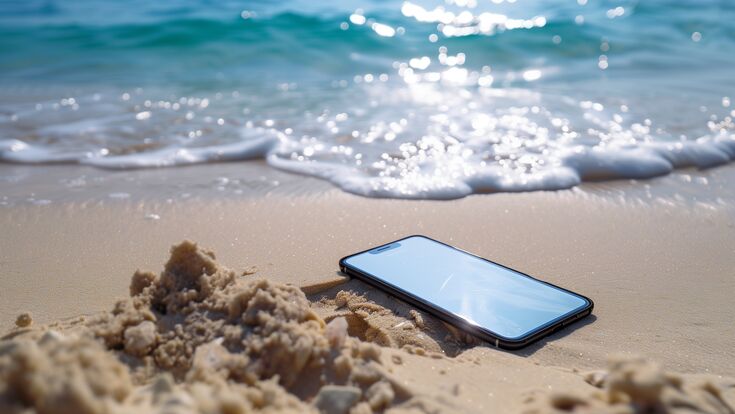Lithium-ion batteries : Smartphones in the sun: Danger of overheated batteries

20 degrees Celsius is the ideal operating temperature for smartphones, but above 30 degrees Celsius it becomes critical for electronic devices. Leaving your phone in the blazing sun or in a hot car not only shortens the life of your smartphone, it also causes it to overheat quickly. If you continue to use your phone despite the warning, the battery will begin to expand and, in the worst case, could explode. The danger lurks not only in smartphones, but anywhere lithium-ion batteries are used, including tablets, e-cigarettes and laptops. "As a rule of thumb, heat and batteries don't mix," explains VOEB Vice President and battery expert Andreas Opelt. "An overheated lithium battery is dangerous, so be sure to turn it off and let it cool down."
Related article: The Hidden Danger: Li-ion Batteries as Fire Hazards in Waste Management Facilities
Mobile phones are not made for heat
The sun is bad for your smartphone. But if you use your phone intensively in the sun, have a lot of apps open in the background or even load them, overheating will increase. Direct sunlight accelerates the electrochemical processes in the battery, the phone itself cannot dissipate the heat, and even protective covers prevent heat dissipation. Smartphones are often damaged as a result. "However, a damaged battery or phone is still valuable. Smartphones contain valuable raw materials such as copper, cobalt, silver and lithium-ion batteries," explains Opelt. Recycling allows these scarce raw materials to be reprocessed and returned to the cycle. This is an important contribution to the circular economy, especially in view of the increasing amount of electronic waste.
Lithium-ion batteries do not belong in household waste
In addition to smartphones, lithium-ion batteries are used in a wide range of everyday items - from tablets and e-scooters to children's toys and e-vapes. "Many people don't realise the deadly consequences of even one improperly disposed battery, as there is an extreme risk of fire if it heats up or is damaged. There are more and more headlines about fires in waste collection centres or recycling companies. The cause is usually a tiny battery that has ignited due to friction or heat," warns Andreas Opelt. "This leads to explosive fires that are difficult to extinguish. The association therefore urges the public to ensure that electronic devices do not contain any batteries before disposing of them, and to return batteries only to retailers or waste collection centres. Furthermore, lithium-ion batteries contain valuable raw materials that can be processed by recycling companies if they are disposed of correctly. If they end up in residual waste, valuable materials such as lithium, nickel or cobalt are lost.
What to do if your mobile phone overheats
- Switch off the device and allow it to cool down: Switch off the mobile phone immediately and remove it from the heat source. Place it in a cool, shady place and allow it to cool down slowly - never put it in the fridge, as this will lead to condensation and further damage.
- Remove the protective cover so that it does not insulate and hinder heat dissipation.
- Close apps and stop background processes: Close running apps, especially those that require a lot of processing power.
- Deactivate unnecessary functions: Switch off GPS, Bluetooth and WLAN, activate flight mode to interrupt all wireless connections.
- Bloated battery: If the battery is bloated, it must not be removed under any circumstances. If the device cannot be moved, cover with sand or extinguish with foam, CO2 or ABC fire extinguisher and cover with a fireproof container. If this is possible without any safety risk, use fireproof tongs to move the smartphone to a safe place away from flammable materials, e.g. in a fireproof container, a metal can or a bucket of sand. The damaged battery should be stored in a well-ventilated area so that dangerous vapours can escape.
